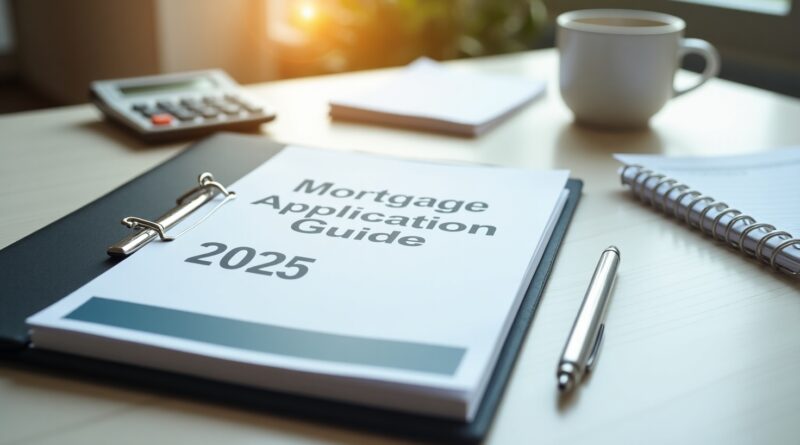Complete Mortgage Application Guide 2025: Everything You Need to Know to Secure Your Home Loan
Are you planning to buy a home this year? Then this complete mortgage application guide 2025 is your must-read roadmap. Applying for a mortgage in 2025 may seem complicated, especially with updated financial policies, digital processes, and new borrower expectations—but don’t worry. This guide simplifies the entire mortgage application journey for you.

✅ What Is a Mortgage Application?
A mortgage application is the formal request you submit to a bank, credit union, or lender asking for a loan to buy a property. This application includes your personal, financial, and employment details that lenders use to determine your eligibility for a home loan.
🏁 Step-by-Step: Complete Mortgage Application Guide 2025
1. Review Your Credit Report and Score
Before submitting any paperwork, check your credit score and correct any errors in your credit report. In 2025, many lenders require a minimum score of 620, though higher scores (740 and above) can help you secure better interest rates.
Tips:
-
Use apps like Credit Karma or CIBIL to monitor your credit
-
Avoid opening new credit lines just before applying
-
Pay off small debts to reduce your debt-to-income (DTI) ratio
2. Understand Your Budget and Loan Eligibility
Use a mortgage calculator to estimate how much home you can afford. Lenders look at your income, debts, and expenses to calculate your DTI ratio. A DTI of 36% or lower is ideal in 2025.
Documents you’ll need to calculate affordability:
-
Monthly income (pay slips, freelancing invoices, etc.)
-
Outstanding debts (loans, credit cards)
-
Expected down payment
3. Choose the Right Mortgage Type
Your loan type will impact your down payment, interest rate, and overall loan terms. In 2025, popular mortgage options include:
-
Fixed-Rate Mortgage (FRM): Ideal for long-term stability
-
Adjustable-Rate Mortgage (ARM): Lower initial rates that may increase
-
FHA Loans: Great for first-time buyers with lower credit
-
VA Loans: For eligible veterans with no down payment
-
Green Mortgages: A new trend in 2025 for energy-efficient homes
4. Get Pre-Approved Before House Hunting
A mortgage pre-approval gives you an edge in the competitive real estate market. It’s not a final approval, but a written statement from the lender showing how much they’re willing to lend.
What lenders require for pre-approval:
-
Income verification (W-2s, tax returns, bank statements)
-
Employment history
-
Credit report access
-
Government-issued ID
Most pre-approvals are valid for 60–90 days.
5. Select a Lender and Compare Offers
Don’t settle for the first lender you meet. Compare interest rates, loan terms, and Annual Percentage Rates (APR) from multiple banks or online mortgage platforms.
In 2025, leading mortgage providers include:
-
Chase Mortgage
-
Wells Fargo
-
Rocket Mortgage
-
Local credit unions
-
Digital-only lenders like SoFi and Better.com
Use the Loan Estimate (LE) document to compare:
-
Interest rate
-
Loan amount
-
Estimated monthly payment
-
Closing costs
6. Submit Your Mortgage Application
Once you’ve chosen your lender, it’s time to apply formally. You can complete your application online, in person, or via a mortgage broker.
You will need:
-
Proof of income (last 2 years of tax returns, pay stubs)
-
Employment verification
-
Credit history
-
Bank and investment account statements
-
Personal ID (passport, driver’s license)
-
Rental history (if applicable)
7. Home Appraisal and Property Inspection
After you apply, the lender will schedule a home appraisal to determine the property’s market value. You should also hire an independent home inspector to check for structural damage, plumbing issues, or electrical faults.
8. Loan Underwriting Process
In underwriting, the lender verifies every detail in your application to ensure you’re a safe borrower. The underwriting process in 2025 is much more automated, but still requires manual checks.
Underwriting may take 1 to 3 weeks, depending on:
-
Your documentation
-
Property value
-
Market conditions
9. Review the Closing Disclosure
Three days before your closing date, you’ll receive a Closing Disclosure (CD). This final document includes:
-
Loan amount
-
Final interest rate
-
Monthly payments
-
Closing costs
-
Taxes and insurance
Review it carefully and flag any discrepancies.
10. Final Approval and Closing Day
If all goes well, you’ll receive final approval and be invited to the closing appointment.
At closing, you will:
-
Sign the mortgage documents
-
Pay the down payment and closing costs (usually 2%–5% of the loan)
-
Finalise the title transfer
Once completed, the home is officially yours, and the lender will fund the loan.

📅 Timeline Overview
| Stage | Duration |
|---|---|
| Credit Review & Budget Planning | 1–2 Weeks |
| Pre-Approval | 3–5 Days |
| Home Search & Offer | Varies |
| Formal Application & Documentation | 1–2 Weeks |
| Appraisal & Underwriting | 2–4 Weeks |
| Closing | 1 Day |
❌ Common Mistakes to Avoid in 2025
-
Not comparing lenders – Could cost you thousands in the long run
-
Skipping pre-approval – Sellers may not take you seriously
-
Ignoring hidden fees – Read all disclosures
-
Changing jobs or making big purchases during the loan process
-
Not budgeting for property taxes and insurance
📌 Pro Tips for First-Time Applicants
-
Keep your credit stable throughout the process
-
Respond promptly to lender requests for documentation
-
Ask questions if you’re unsure about fees or terms
-
Consider hiring a real estate attorney for closing day
🧾 Frequently Asked Questions (FAQs)
Q1. Can I apply for a mortgage online in 2025?
Yes. Many lenders offer 100% digital applications with e-signature options.
Q2. How much should I save before applying?
Aim to save at least 10% of the home price for down payment, closing costs, and emergency reserves.
Q3. Will student loan debt affect my mortgage application?
Yes, lenders will include student loans in your debt-to-income ratio calculation.
Q4. Can I get a mortgage if I’m self-employed?
Absolutely. You’ll just need to provide more documentation, such as profit/loss statements and two years of tax returns.
Q5. What if my mortgage application is denied?
You can ask for the reason, improve your credit or DTI, and reapply after addressing the issues.
🎯 Conclusion: Your 2025 Mortgage Success Starts Here
This complete mortgage application guide 2025 gives you the clarity and tools needed to confidently apply for a home loan in today’s market. From understanding your credit to closing on your new home, each step matters. With preparation, the right lender, and a clear plan, your dream of homeownership is just a signature away.

